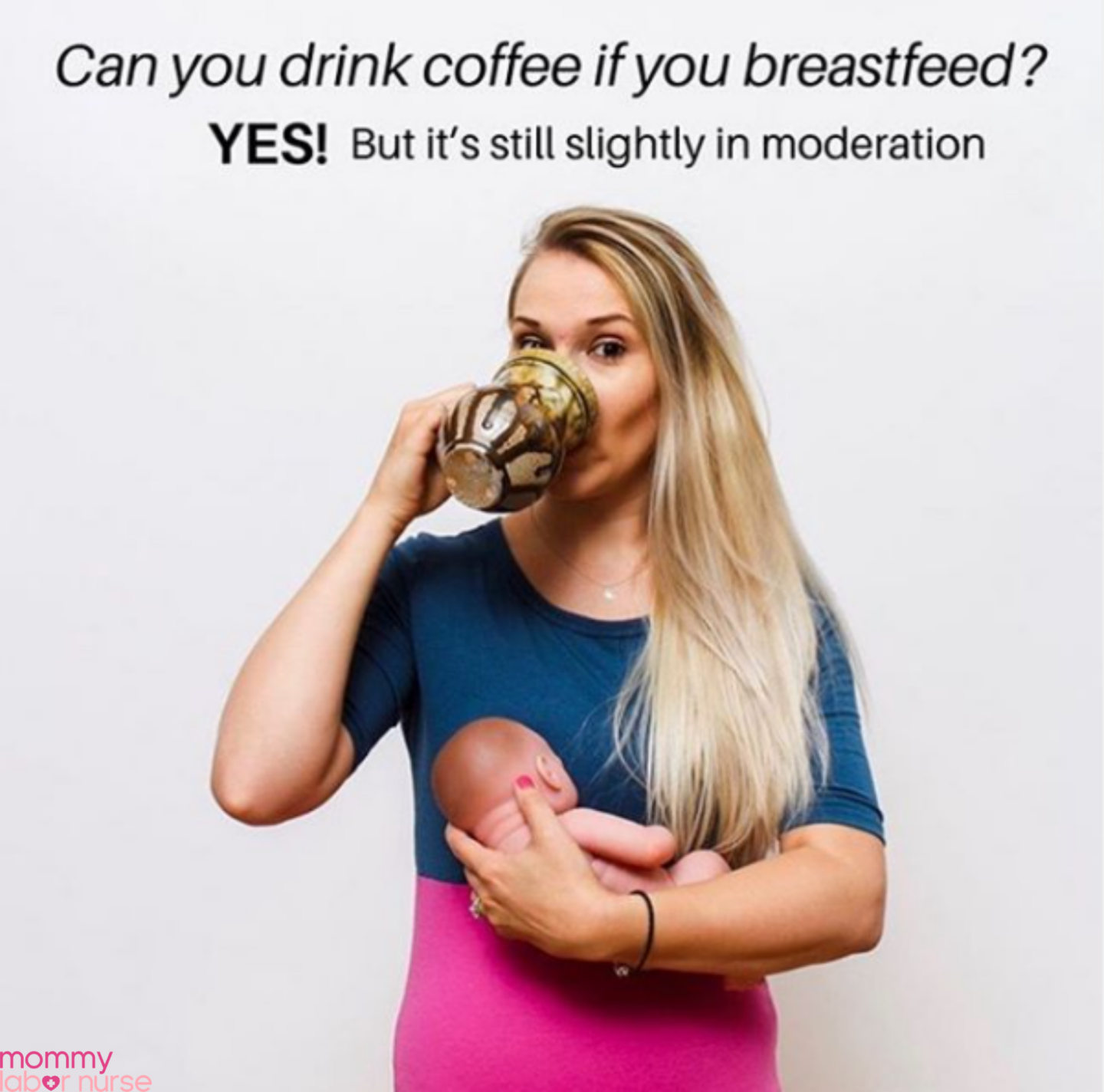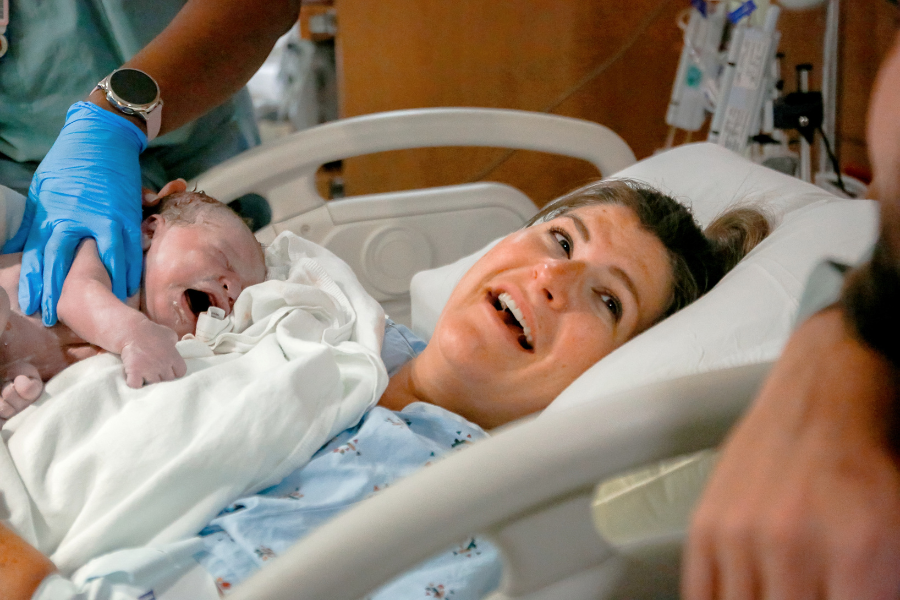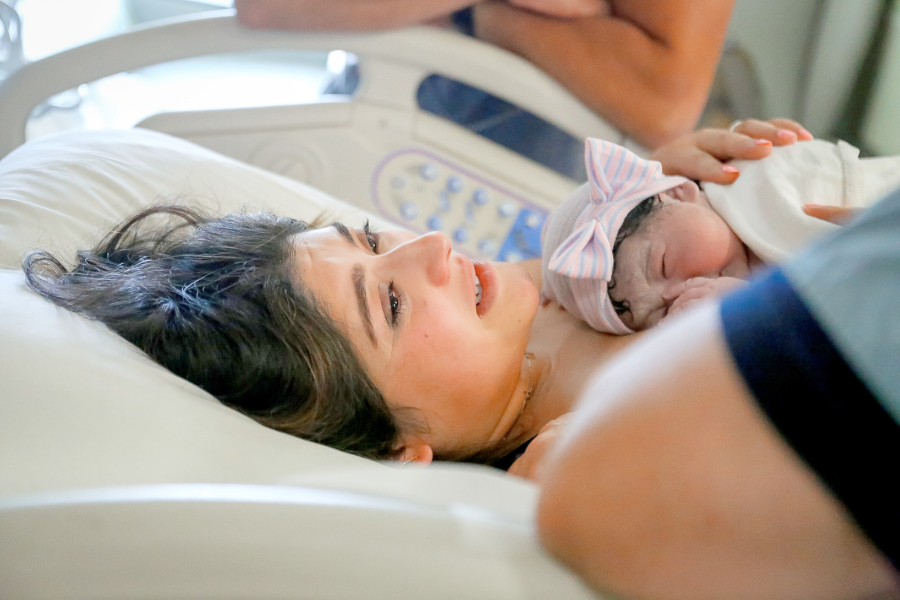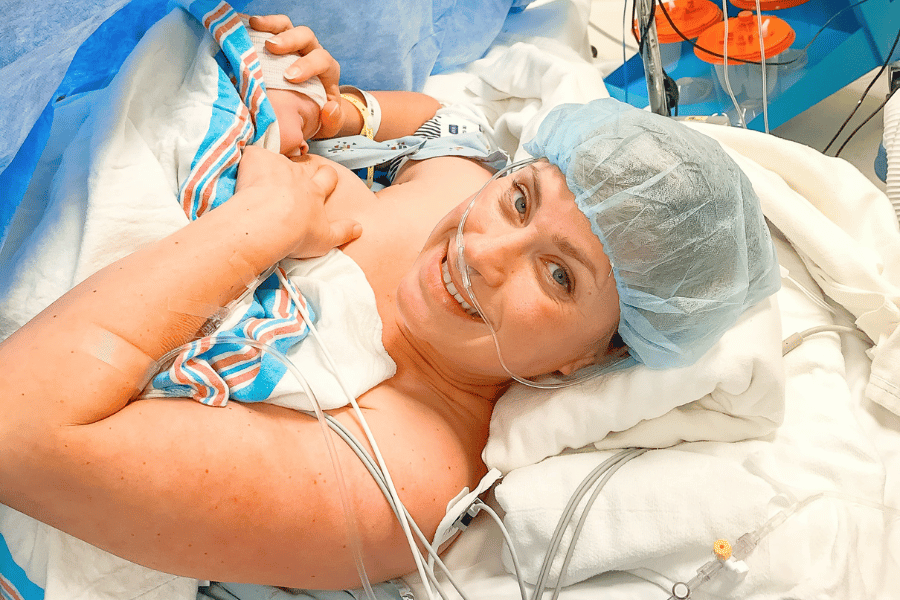And I’m here to tell you mama, there’s no suffering like going without caffeine.
This begs the question..Do we HAVE to just suffer through it? To answer this question, you have to answer a few supplementals: IS caffeine in breast milk a problem? How long does caffeine stay in breast milk? How much caffeine is safe when I’m breastfeeding?
I’ve been excited to share some answers about caffeine while breastfeeding for you guys. Read on!
- How long does caffeine stay in breast milk?
- Does caffeine get passed through breast milk?
- Can I drink coffee while breastfeeding?
- How much caffeine is safe when I’m breastfeeding?
- What is the half life of caffeine?
- What about energy drinks and breastfeeding?
- Sources of caffeine
- Caffeine while breastfeeding side effects
- How much is too much caffeine in breast milk for baby?
- Chocolate and breastfeeding
- Does caffeine affect milk supply?
Follow @mommy.labornurse on Instagram to join our community of over 650k for education, tips, and solidarity on all things pregnancy, birth, and postpartum!
How long does caffeine stay in breast milk?
This is a simple question with a simple answer.
Although the exact amount of time that you’ll see caffeine in breast milk will differ from person to person, we’ve found that it’s usually completely gone from your body after 24 hours (although keep in mind – this CAN vary). We know that the half life of caffeine in breast milk is anywhere between 1.5 and 14.5 hours.
What the heck is a half life, you ask? Great news! We’ll talk more about what half life means a little later–no spoilers, you’ll have to keep reading!
And for another fun fact…caffeine becomes detectable within fifteen minutes of ingesting it, and peak levels are reached in saliva and milk within one hour (source).
Does caffeine get passed through breast milk?
This is a fair question mama! Unfortunately, the answer is yes – however, it isn’t very much.
The percentage of caffeine while breastfeeding transferred to baby varies, but typically floats between .06% to 1.5% of whatever you’ve consumed. Although this truly IS a tiny amount (that’s right, you have a GREEN LIGHT on grabbing that cup of coffee, lady!), there are some essential precautions you’ll want to take. We’ll talk about some of those later.
Want to boost your milk supply? Try out these DELICIOUS Mommy Knows Best cookies!
Can I drink coffee while breastfeeding?

If you’ve found yourself asking “do coffee and breastfeeding mix,” the short answer is yes – in moderation. Coffee and breast milk is perfectly safe as long as you’re staying within the recommended two to three cups maximum per day. The caveat of coffee and breastfeeding is that you NEED to make sure you’re checking the caffeine content of whatever you drink. I think you’d be surprised just how widely caffeine content can vary between coffee drinks.
As you’ll see below, I’ve listed the caffeine content of more popular dietary products that include caffeine (including your favorite drinks!)
There are a few things to keep in mind when choosing a coffee drink. Iced coffee tends to have less caffeine than hot coffee, although you still need to check because this isn’t always the case (apparently nothing in life can be certain).
Another thing to consider..If you’re making a pot of coffee at home, take note of how you portion your grounds. If you WEIGH your scoops, a darker roast will have more caffeine than the same weight in light roast, as dark coffee is less dense due to water content roasting off–essentially, you will fit more beans into your target weight because they are lighter than unroasted beans.
Naturally, if you measure out your coffee by the NUMBER of scoops, the lighter brew will have more caffeine. This means if you don’t weigh your coffee, consider sticking with a dark roast.
Related Reading: A Breastfeeding Mom’s Review of an Online Breastfeeding Class
How much caffeine is safe when I’m breastfeeding?
The SAFE amount of caffeine while breastfeeding depends on a few different factors – but as a general rule, you should be okay with around 300 mg of caffeine daily (although it’s never a bad idea to check in with your medical professional just in case). To give you an idea, that’s around two or three cups of coffee total.
Please remember the importance of checking for caffeine content in everything you ingest, as it tends to sneak its way into our systems via different foods or medications.
A “safe” amount of caffeine while breastfeeding can vary depending on a few factors, such as your baby’s age and their tolerance. Preterm and brand new babies will metabolize caffeine more slowly, so you need to be more careful with your caffeine intake as they’re going to be more sensitive to it. Also, be advised that some babies simply can’t tolerate caffeine.
Later we’ll talk about some signs you can watch out for if you suspect your baby has a caffeine sensitivity.
What is the half life of caffeine?
Okay, mama. This section is going to be a little heavier to read, but I wanted to provide you with enough information to understand the relationship between caffeine and your baby. In case you don’t want to read my explanation, just know that the half life can be up to 97 hours for newborns, and 14 hours when they reach 3-5 months.
In case you aren’t familiar with the term, the half life of medication indicates the time it takes for that medication to be working at fifty percent of its full dosage. For example, the half life of Ibuprofen is around two hours. That means if you took 600 mg of Ibuprofen, you would have 300 mg still working for you two hours later.
In general, most things are metabolized much faster for an adult versus a newborn. For adults, caffeine has an average half life of 6 hours (meaning the body takes 6 hours to eliminate HALF of the caffeine).
For newborns, the half life can be as high as 97.5 hours, which decreases to around 14 hours at three to five months. So, it makes sense WHY you need to be more careful with caffeine intake with a brand new baby. We don’t want to continue piling more caffeine into their system.
In short, that little baby might still be drinking last Wednesday’s cup of coffee on SUNDAY. If only we were all so lucky.
Now, I know that was a lot of information, but I hope it gives you a better understanding of how caffeine while breastfeeding affects your little one.
Related Reading: What You Need to Know About Breastfeeding
What about energy drinks and breastfeeding?
While the caffeine content of ONE energy drink is usually not a problem, there’s a lot more than meets the eye when it comes to what’s in your favorite energy drink.
I’ve gathered information on some of the most common ingredients found in popular energy drinks (I’m lookin’ at you, Red Bull and Monster).
These ingredients are questionable at best, potentially harmful at worst. I definitely recommend checking out the ingredients carefully before you choose to pop open a can.
And, as always…talk with your doctor. That’s what they’re there for. They know you and your situation best, so if they think it’s okay – go right ahead.
Taurine
Taurine is a common ingredient found in meat and fish (in smaller amounts) as well as many energy drinks (in larger amounts). It is supposed to help increase your endurance and is generally considered to be safe. While I’m in agreement that new mamas can benefit from an increase in endurance (who am I kidding – NOT new mama’s need this too!), there’s not enough research to know whether it’s safe to consume while breastfeeding. That’s why the official stance is you should probably try to avoid it.
Ginseng
Ginseng (as well as other similar herbs, such as Ginkgo Biloba) are added to energy drinks to help enhance your brain performance. It’s listed as an L3 (moderately safe) drug during breastfeeding – with some caveats. If you’re using an antidepressant or take insulin from external sources, Ginseng can cause a drug interaction and MUST be avoided.
Not only this, but recent research has shown that Ginseng may trigger estrogenic activity, which is a fancy way of saying it might cause adverse effects for you by mimicking estrogen cells. Checking with your doctor before consuming Ginseng is undoubtedly the safest bet.
Guarana
Guarana is a natural stimulant that contains caffeine. It’s added to energy drinks because it allows for a slower release of caffeine, thus making its effects last longer. The actual amount of caffeine in Guarana is unknown and it DOES secrete into breast milk, making it something you should try and avoid during breastfeeding (especially with that nasty half life of caffeine might already be lurking in your baby’s bloodstream).
B Vitamins
B Vitamins are incredibly vital for you and your baby, but too much can cause a toxicity. There is Vitamin B in many vitamin supplements (including your prenatal), so ingesting energy drinks on top of that could cause a toxicity. Yikes.
Sources of caffeine
I know you understand the importance of checking for caffeine content. This information can be ROUGH to find! Because of this, I’ve created a list of common products and their caffeine content so it’s easier for you to keep track. Some things on this list may surprise you, which is why it’s always important to check!
| PRODUCT | AMOUNT | CAFFEINE (MG) |
| Redbull | 12 oz | 111 mg |
| Monster | 16 oz | 160 mg |
| Starbucks Blonde Roast Coffee | 12 oz | 260 mg |
| Starbucks Dark Coffee | 12 oz | 93 mg |
| Starbucks Iced Coffee | 12 oz | 120 mg |
| Starbucks Café Latte | 12 oz | 75 mg |
| Starbucks Green Tea Latte | 12 oz | 55 mg |
| Starbucks Chai Tea Latte | 12 oz | 40 mg |
| Starbucks Caramel Frappe | 12 oz | 70 mg |
| Coffee | 8 oz | 70-140 mg |
| Coke | 12 oz | 34 mg |
| Diet Coke | 12 oz | 46 mg |
| Pepsi | 12 oz | 38 mg |
| Mountain Dew | 12 oz | 54 mg |
| Dr Pepper | 12 oz | 41 mg |
| Black Tea | 8 oz | 25-50 mg |
| Green Tea | 8 oz | 25-30 mg |
| Excedrin Extra Strength | 1 tablet | 65 mg |
| Dark Chocolate | 1 oz | 12 mg |
Caffeine while breastfeeding side effects
Your breastfed baby will most likely not be symptomatic from your caffeine intake – as long as you stay within the recommended amount of no more than 300 mg per day. Many new mothers are concerned that caffeine while breastfeeding is keeping baby awake – but it truly shouldn’t. With that said, you need to be more careful with a baby under six months, as the half life of caffeine is much longer for young babies.
Now, just because that isn’t the typical situation doesn’t mean it can’t happen. Just in case you are the lucky snowflake who has a caffeine intolerant baby (sorry!), I wanted to give you some signs to watch out for.
Related Reading: What is Dysphoric Milk Ejection Reflex?
Signs of caffeine sensitivity in infants
- Irritability
- Overstimulation
- Jitters
- Fussiness
- Wakefulness
- Difficulty staying asleep
If you’re seeing these symptoms in your little one, you have a few responsibilities. First – check with your pediatrician (notice how often I say that? It’s the best way to be safe with… well, almost everything).
Second, decrease your caffeine intake and see if that helps. You should notice a difference within a few days if your baby was sensitive to your caffeine intake.
After that – the proof is in the pudding. We’ve seen multiple cases where babies sleep better and become less fussy when the mother significantly reduces or stops the intake of caffeine.
There could be other factors at play, but it’s certainly a good place to start.
How much is too much caffeine in breast milk for baby?
While the recommended “safe” amount of caffeine while breastfeeding is 300 mg, a study was done that showed infants that ranged from 22 days to 71 days had no problems after the mother consumed 500 mg of caffeine daily (source).
Naturally, this is not true for ALL babies, so it’s better to stay within the recommended amount. It’s good to know that going over a little will likely be just fine. We almost always see problems when a mother consumes over 750 mg of caffeine a day, so definitely don’t allow yourself to exceed this. Playing it safe is still the better option.
Related Reading: What to Do When Breastfeeding Hurts
Chocolate and breastfeeding
It’s understandable to worry about the effects of eating chocolate while breastfeeding – especially when you consider that chocolate has two separate ingredients that could cause potential symptoms in your baby if eaten in very high amounts. In the following section, we’ll talk about theobromine and caffeine content in chocolate.
Theobromine and breastfeeding
Wondering if the theobromine in chocolate counts against your daily caffeine allotment? It kind of does – but it would take an awful lot of chocolate to overdo it.
Theobromine and caffeine are not the same things, but they are similar in the way they affect your and your baby’s body. A small study was done, which showed us that a woman could eat a four-ounce chocolate bar every six hours, and would only be exposed to 10mg of theobromine in total.
That is assuming her baby drank a liter of milk daily. If you notice your baby becoming irritable or jumpy after a very large bar of dark chocolate, try switching to white chocolate, which contains no theobromine.
Caffeine in chocolate
The amount of caffeine in chocolate is pretty minimal. As long as you aren’t ingesting vast amounts of dark chocolate, it’s pretty safe to say it would be hard to eat too much chocolate. Again, if your baby seems fussy during breastfeeding it’s worth examining your diet and making changes to see if it helps.
Related Reading: 30 Things I Did to Increase Milk Supply
Does caffeine affect milk supply?
Short answer – no. No research backs this theory up, yet there are many mamas who believe this. Keep in mind; it’s only a tiny percentage of moms who actually suffer from a low milk supply, although many mothers genuinely believe they have a low milk supply.
If you’re feeling clueless with breastfeeding, check out this lactation consultant’s breastfeeding course. She solves any problem you could think of, and it’s well worth the low cost.
That said, it may seem like I’m grasping for straws, but there is a way that caffeine while breastfeeding could inadvertently lower your supply.
If your baby has a caffeine sensitivity, that can make breastfeeding more complicated for your baby (because they don’t feel good). Baby is more fussy, then baby eats less. This, in turn, could end up lowering your milk supply. See how that works? With that said, remember that caffeine itself will not decrease your milk supply.
I’m happy I was able to answer some of your burning questions about caffeine while breastfeeding! You now have the answers for how long caffeine stays in breast milk, and you know the signs of caffeine sensitivity in infants (just in case!)
In short, it’s moderately safe to consume caffeine while breastfeeding, as long as you don’t go overboard. Check the caffeine content on what you ingest, and try not to go over that 300 mg a day. If you notice your baby getting fussy, cut the caffeine out for a couple of days and see if it improves.
Best of luck mama!





